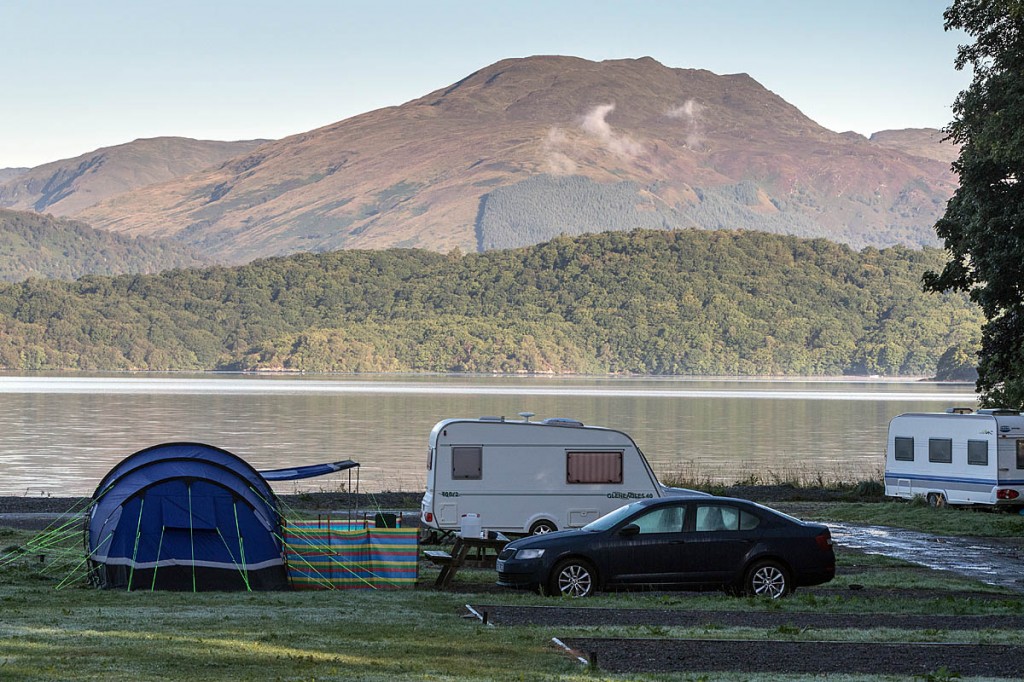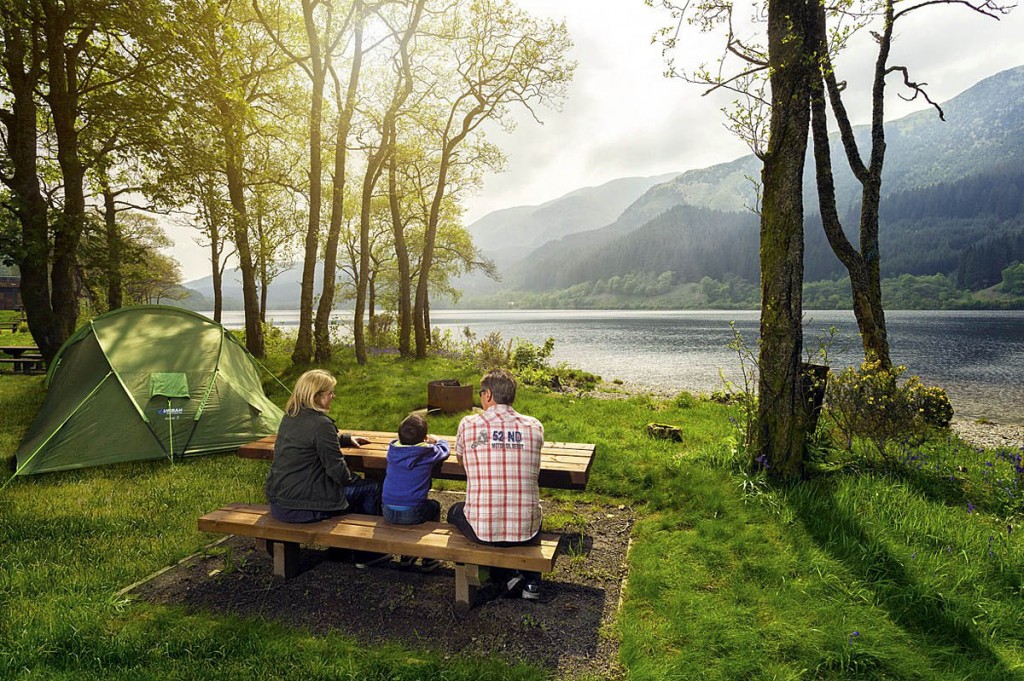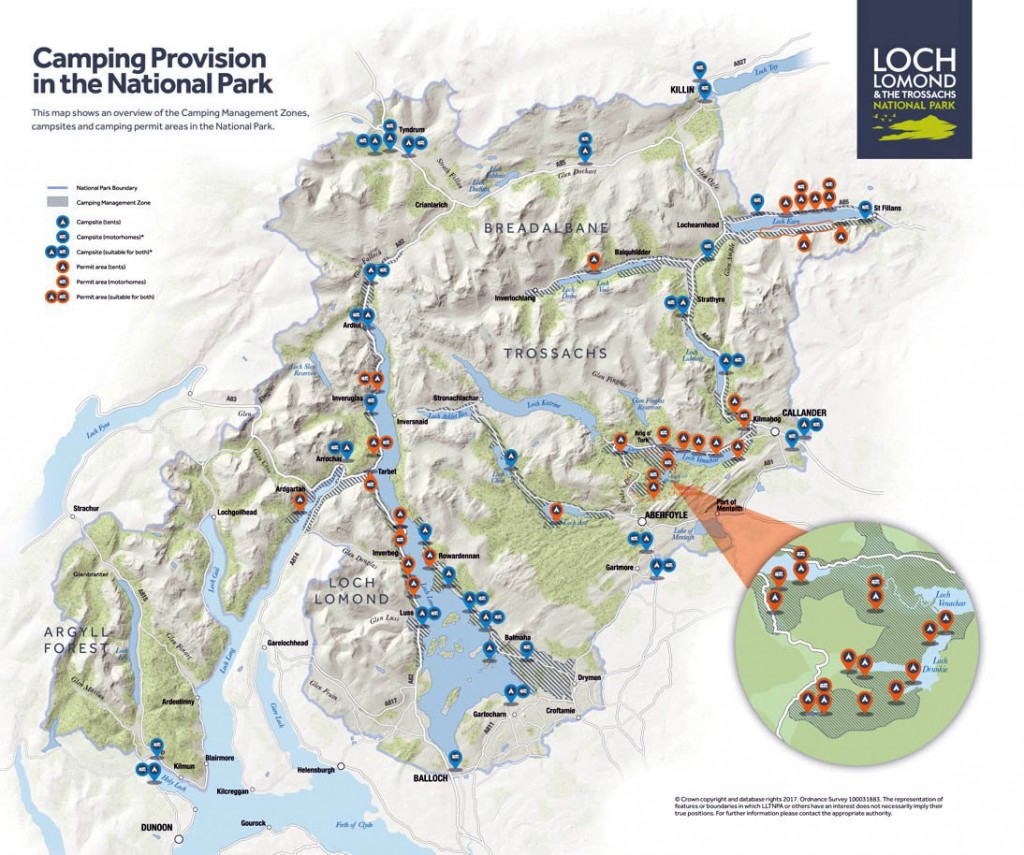A controversial camping permit scheme comes in to force in a Scottish national park this week.
Anyone wanting to pitch their tent in certain areas of the Loch Lomond and the Trossachs park will have to buy a permit or use official sites.
The park authority warned its new bylaws will come into effect on 1 March, covering four lochside camping management zones. Contravening the new rules could land campers with a criminal record.
Opponents of the new scheme said it goes against Scotland’s right-to-roam law, which gives the public the right to wild camp responsibly in the nation’s countryside.
The authority said between March and September people who want to camp or stay overnight in a motorhome or campervan at one of the popular lochshore locations in the park will have to buy a camping permit or book a pitch at a campsite.
It said: “The camping management zones are focused around the national park’s busiest lochshore locations which attract very high numbers of campers year on year. This volume, combined with the antisocial behaviour of a minority of campers over a number of years, has a significantly damaging effect on the environment and a negative impact on other visitors and local communities.”
The authority said it has provided more than 300 camping and motorhome pitches, and the area covered by the bylaws amounts to only four per cent of the national park’s area.
Chief executive Gordon Watson said: “The aim of the bylaws is to protect these precious locations and make sure everyone can enjoy them now and in the future.
“Given the dramatic transformation seen on east Loch Lomond since bylaws were introduced there in 2011, we are confident we will see improvements with more responsible behaviour and less damage to the environment.
“Our focus as always is to encourage and support people to enjoy the national park while at the same time protecting its special environment.
“Our rangers will continue welcoming people and educating them on all the aspects of the park. This will include providing information to make sure all visitors can camp responsibly.
“Our experience on east Loch Lomond is that most people want to do the right thing to help look after such a special place. This is not about looking to catch people out who might be camping in the wrong place, as taking formal action would always be a last resort, but helping them understand where and how they can camp responsibly.
“The first season of the bylaws being in place gives us an opportunity to fine-tune their operation. We will be closely monitoring how the bylaws and camping provision are working. In particular, we are keen to gather feedback from campers and other visitors, as well as local communities, and partner organisations through our stakeholder forum.”

Visitors are being encouraged to use sites such as Cashel, on the east shore of Loch Lomond. Photo: Bob Smith/grough
The authority is urging visitors to use privately run campsites throughout the national park or low-cost, informal campsites that have been set up, with bookable pitches, parking, water and toilets at Loch Chon, and Loch Lubnaig in the Trossachs.
Permits to camp elsewhere cost £3 per tent, motorhome or campervan per night and can be booked online up to eight weeks in advance, it said. The new campsite at Loch Chon costs £7 per adult per night. Costs at other privately run campsites vary.
While most laybys are regulated by highway authorities and are not affected by the new camping management bylaws, a number of laybys inside camping management zones are regulated by the national park camping bylaws. The authority said: “These will be clearly marked with signage about the bylaws. Anyone can stop and rest in these laybys during the day but you cannot sleep overnight in your vehicle.
“Where there are places for motorhomes to stay overnight, there will be specific signs making this clear. Permits for staying overnight in these spaces should be booked online in advance.”
The bylaws also cover fire lighting. Park bosses said: “If you have a fire when you are camping it should be small, under control, and you should bring your own firewood. Causing damage such as chopping trees for firewood is also a breach of the bylaws.”
Loch Lomond and the Trossachs National Park Authority said: “In the most extreme cases of those who refuse to comply with the bylaws, a report could be sent to the procurator fiscal who could impose a potential fine of up to £500. Any criminal record would be imposed at the court’s discretion.”
Mr Watson said: “Camping is one of the best ways to get out and enjoy the stunning surroundings we have in the national park and there is every kind of camping experience on offer here.
“The new bylaws do not change that. Whether you’re an experienced camper, coming on your own or with your friends and family, there is still a wide choice of places to camp in the national park. To support this we have opened a new campsite in the Trossachs at Loch Chon and are promoting some excellent locations to ‘wild camp’ with a permit.
“Our focus just now is on making everyone coming to camp in the park fully aware of how the bylaws work and of all the camping options available to them.”
Outside the zones covered by the bylaws, responsible wild camping is allowed in accordance with the Land Reform (Scotland) Act and the Scottish Outdoor Access Code.
Ramblers Scotland, which represents walkers north of the border, said: “National parks should be aiming to attract large numbers of visitors. This can cause pressure on individual areas, so we support the park’s plan to provide more camping infrastructure, including toilets, and bins. However, their planned provision of about 300 camping spaces doesn’t meet levels of demand from before the bylaws, when up to 800 tents were recorded on busy weekends.
“We believe the park should have tackled any issues with over-use and antisocial behaviour by investing in low-cost campsites and enforcing existing laws.”
Director Brendan Paddy said: “We’re disappointed that the park is going ahead with this plan.
“It undermines Scottish access rights by providing too few tent pitches to cope with demand and by charging to camp in previously free areas. Campers often won’t get any toilets, drinking water or bins in return – and we fear the hassle, cost and insufficient number of permits may put people off visiting this wonderful area.
“I encourage campers to ensure they don’t fall foul of the bylaws by checking out the guidance we’ve published on our website. While we don’t want to see the bylaws renewed in three years’ time, we are advising campers to heed advice from rangers or police, and let us know about their experiences.”
Ramblers Scotland said people could email the organisation or use social media to report their experiences.



DAMION LEITCH
27 February 2017One of the major attractions to visitors from overseas is the fact you can wild camp in Scotland, I get asked about this all the time.
This is eroding peoples freedoms and costing people money to enjoy the countryside. Who's right is it to prevent the public from freedom of use?
Don't punish the majority for the actions of the minority. Police the park 24/7 with your rangers, report offenders to the police, equip your rangers with wearable cctv and radios.
Shocking move.
Stu Westfield
27 February 2017Penalise the majority for the actions of the few?
Then the answer is to directly crack down on anti-social behaviour. All that this will achieve is to displace the problem.
Or is this a smokescreen for revenue generation,
and using the respected title of 'Ranger' in lieu of parking attendant?
Ricky Hynd
27 February 2017No doubt the management zones will not only restrict camping,but also overnight parking. This will in turn prevent any true wild campers from heading into the hills with a tent and camping well away from the restricted areas unless they travel by publicly transport
Diddy
28 February 2017Had to happen. After a ski trip, I stayed in a micro-camper at layby near Luss and saw first hand one of the issues -a group of 6 or7 teenagers complete with beer cans, Bar-B-Q trays, music ready to party. I put them off- they went further on.
From previous sessions I cleared the lay-by of all debris. The trays have to be left as they too warm to carry out quickly after use .
I wild camp a lot and will sort out a permit. I wonder about truck drivers using these lay-bys.
Anna Day
28 February 2017I am really sad and disappointed in the developments in the National Park area. I have a cultural connection go this area living nearby and being brought here by my parents and in turn bringing my child here.
I was fined £60 pounds for parking in an off road area. I had my disabled son, a wheelchair user with me and my blue badge on display, we were picnicking nearby.
We have never been back...and it saddens me. You say things have improved .that's .because no one wants to go there anymore it is not a welcoming area. The board do not consult with potential users and have done nothing but alienate the masses because of a few disruptive groups camping.
Grough indeed!
Robbie Colligan
28 February 2017A draconian bylaw that is nothing more than a collective punishment because of a minority of irresponsible campers.This bylaw will only move the problem elsewhere when you should really be targeting the ones causing the problems. It's a sad day when the majority are punished because of the irresponsible few who should have been strongly targeted to start with before it got out of hand, all you have done is give someone else the problem you haven't solved it. Disgraceful cowardly decision to implement this draconian collective punishment and make no mistake that's exactly what it is. shame on You
Ross
01 March 2017Penalised for the actions of the few? It maybe more concentrated abuse by 'them' goes on in this area but bothies & wild spots in the most remote areas are abused by 'us'. Our 'community' needs to take a look at itself. Freedom brings burden of responsibility.
Margaret
01 March 2017Very good comments Ross. Suppose the older ethos doesn't fit with the modern way.
Thomas Schmidt
01 March 2017The rangers and police have always had a right to remove and penalise those who infringe the right to roam act by not acting responsibly. The bye laws are simply aimed at commercialisation of the parks by authorities supposedly in charge of their protection and the businesses that lobby and profit from the introduction of such bye laws.
OutdoorsAndy
02 March 2017I see the mess left by the few, but agree with most above.
It will just push the louts out further. They need draconian fines and criminal records for repeat offenders.
As a regular highlands visitor, I am seeing more mess in remote areas now. Its ultimately just pushing the problem to other areas.
Police and prosecute is the answer.
Stevo
05 March 2017Agree with the comments that suggest this is just a cover for revenue generation.
Parking restrictions get placed on roads and around about the same time car parks such as Rowardennan introduce fees.
Camping restrictions which fly in the face of Scottish Access Rights get introduced but you can always pay to stay in one of our sites. Campsites not for you, how about our new permit system then?
You can also bet that other interested parties are watching this closely. How long before these measures get introduced to other areas in Scotland?
Remember, the Park Authority has a remit that goes well beyond the environmental concerns that they are so vocal about. Economic development of the area and managing visitor numbers are in there too are they not? The question is, are you the right kind of visitor?
Stephen
27 April 2017My recent encounter loch voil trossachs obnoxious warden experience
He man pulls up in 4x4 I say hello ,is this your vehicle he barks ,yes ,it is not permitted to park here you will be gone by time I get back.it was not till after he left that the blood began to boil ,no return of my hello was a disgrace I put kayak back in van and went home raging I will never pick up others people again this task is also above the wardens who would rather be campsite managers